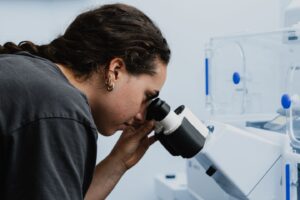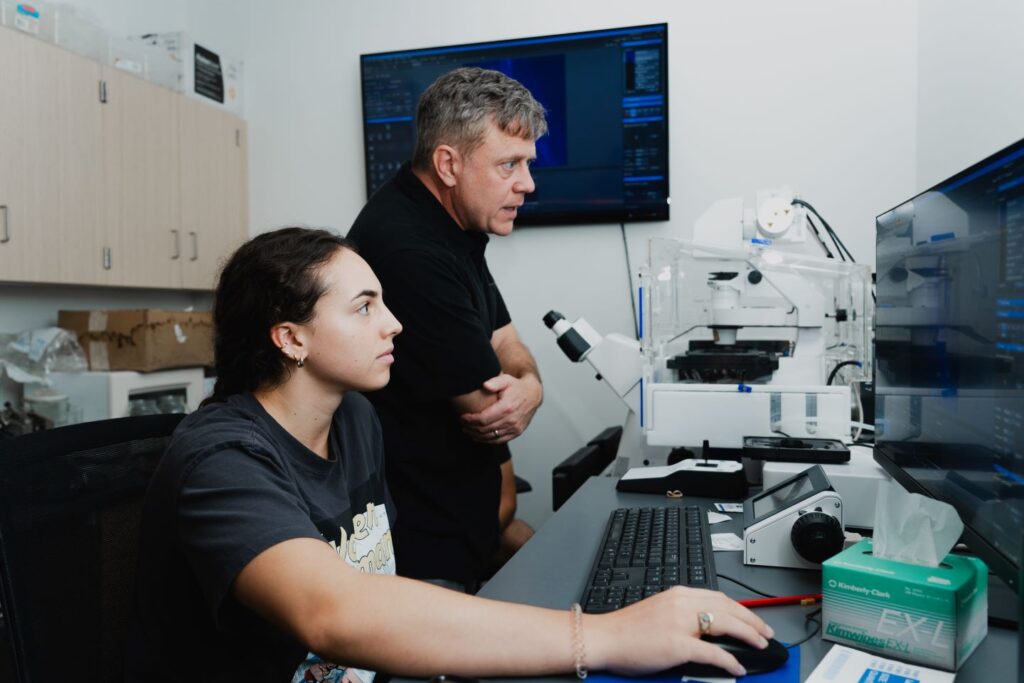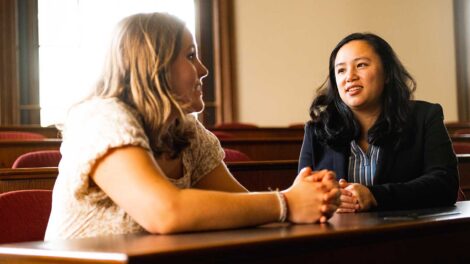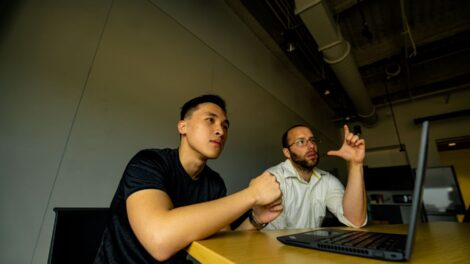Student-faculty research offers possibilities for improved human health
By Bryan Hay
When Abigail Mack ’24 looks deep into the translucent eyes of a freshwater turtle, she envisions a rewarding medical career and hope for the future of human health care.
Since her junior year, Mack, an EXCEL Scholar majoring in biology and minoring in biotechnology and bioengineering, has been collaborating with James Dearworth Jr., associate professor of biology and department head, in researching how turtle retina cells respond to glutamate under different temperatures.

Abigail Mack ’24
The work of this Lafayette student-faculty research team is particularly important because of its potential to prevent or control the damage caused by strokes in humans. While glutamate is a vital neurotransmitter in humans, used by the central nervous system to communicate with one cell to the other, too much of it presents a problem during an ischemic stroke. During a stroke, blood flow is blocked, and glutamate concentrations soar in the brain, which become toxic killing neurons.
“When people get blood clots and strokes, our whole nervous system shuts down,” says Mack, who plans to pursue a medical degree in ophthalmology after Lafayette. “Turtles, which have an abundance of glutamate in their retinas, have a way to combat this. So, learning about how they do this by studying how glutamate reacts in them would benefit humans and stroke survival of humans. It’s simply fascinating to study this.”
Dearworth explains that by studying glutamate’s reaction under different temperatures it might lead to breakthroughs on how to control its excessive and dangerous release during a stroke. The work involves use of the red-eared slider, an invasive species of turtle in several states, including Pennsylvania.

Abigail Mack ’24 and James Dearworth Jr., associate professor of biology and department head, are researching how turtle retina cells respond to glutamate under different temperatures.
“When someone has a stroke, you have to do something quickly, otherwise that glutamate is going to basically get over-excited and kill everything,” he says.
Drawn into the research when she took Dearworth’s Anatomy of Vision course last year, Mack’s interest in eyes began to open. It broadened further when she talked with Dearworth about his turtle retina research and its many positive possibilities to improve human health.
Her interest in this research also results from being diagnosed with myasthenia gravis, an autoimmune disease that causes voluntary muscles to feel weak and get tired quickly. Mack wants to learn more about how it affects the eyes and face so she can help others.
“I figured I would talk to him about it, to see if he had any openings in his lab for an assistant. And he did, and he brought me in,” Mack recalls. “I figured turtle eyes can translate over to human eyes, and since I’ve been in his lab, I’ve learned so much about other important areas of this research. It’s been the perfect lab experience for me.”
A purely Lafayette experience
“There’s definitely things here that you don’t find anywhere else,” says Mack, a member of the swimming and diving team. “Using the powerful microscopes at Rockwell Integrated Sciences Center to examine retinas is amazing. And at Lafayette, I can combine engineering, chemistry, and biology. That’s something that’s going to be really good on my resume.”
Knowing how to use Rockwell’s confocal and electron microscopes also will be a plus, she says, adding that it will give her a head start as she pursues ophthalmology with the neuro specialty.
“Working with eyes and then learning about how glutamate works as a neurotransmitter, all this will definitely help me with my career goals,” Mack says. “Other schools with graduate programs don’t have undergraduate students doing this kind of detailed research. So that’s another reason why this is a really good opportunity.”
A Lafayette professor’s joy
“It’s always exciting to have students who are interested in your research,” Dearworth says. “Abigail hit the ground running as soon as we started summer research together. That doesn’t always happen that easily. She’d taken my anatomy vision course, which is also very helpful because it provides a nice foundation for all this work. She has come into this lab with really good context.”
Mack says she sees Dearworth almost every day and values his supportive teaching style and mentorship.
“He lets us go off on our own sometimes. But he’s here all the time, helping when there’s a need or question, especially with how to use the precision microscopes and other lab equipment,” she observes. “We can just go into his office and ask him for help or email him.”
Mack was looking for and found at Lafayette a college that would offer a strong teacher-student connection as well as swimming and opportunities to study multiple fields.
“I found Lafayette super-welcoming from the start,” she says.

